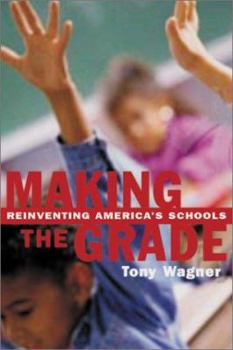Making the Grade: Reinventing America's Schools
Select Format
Select Condition 
Book Overview
This book provides a guide for a long-overdue public dialogue about why and how we need to reinvent our nation's schools. How has the world changed for our children; what do all students need to know... This description may be from another edition of this product.
Format:Hardcover
Language:English
ISBN:0415927692
ISBN13:9780415927697
Release Date:October 2001
Publisher:Routledge
Length:160 Pages
Weight:0.90 lbs.
Dimensions:0.7" x 6.3" x 9.2"
Customer Reviews
1 rating
Glad I waded through the pedagogic pap
Published by Thriftbooks.com User , 22 years ago
After the de rigeur citations of every great thinker from Einstein to Jean Piaget, Wagner finally gets on with letting us know what he thinks. His own thoughts are good enough that he didn't need to lean on current heavies from Harvard or big names from bygone eras. His point is that standardized tests aren't the answer, but before we deal with them we need to focus on the problem they address. Are kids getting what they need out of school? What can and should be expected from them? Are schools organized optimally to deliver education?His assessment of the need: Kids need the basics -- reading, writing and arithmetic. Today's kids need a richer dose of the following: 1) exposure to adults, along with understanding and approval; 2) ability to work in teams; 3) training in citizenship. He relates the need to the labor marketplace in which workers increasingly need to work with and exchange ideas. He says that what they need is "Emotional Intelligence," one of those trendy concepts that has so swept the pedagogues that the latest evidence of my fossil status my 13-year-old has dug up is a lack of "EQ." However trendy, it remains true that kids need to be socialized, though I can't imagine it ever being unimporant.Wagner recognizes that standard tests do not measure kids' individuality. They learn differently. They have different abilities to learn. Furthermore, teachers aren't robots. Different teachers have differing approaches. He recommends that parents have the freedom to choose schools that are appropriate to the needs of their children. He provides strong evidence that it can be done within the context of a public school system.One of the strongest points Wagner makes is that a teacher's effectiveness is related to the amount of respect they get from their employer and the extent to which they can choose their own teaching style and materials. I know this first hand as a private school trustee, parent and substitute teacher. Teachers want to teach. They are passionate about it when the materials are their own, when they can talk with collegues about the best ways to teach, to integrate curriculum, to reach a certain kid, and so on. The passion dies when they are told that all 10th graders in California will cover pages 38-50 of Silas Marner on October 15. Wagner's best point goes to organization. State school superintendents and elected boards of education know more about politics than they do education. Schools need to be small (400 kids or less), largely autonomous (set their own curriculum, choose their own materials), and supported by parents (free to choose which among several public schools best suits their children's needs). Parents who have a say in the school will become involved. Teachers who see the same kids over a period of years, and see maybe 40 instead of 150 different faces over the course of a day, will know more about those kids and be better able to help them. Wagner cites a lot of evidence that sm






